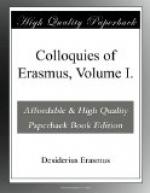Eut. That this may be a merry and happy Banquet, in the first Place I command, that no Man tell a Story but what is a ridiculous one. He that shall have no Story to tell, shall pay a Groat, to be spent in Wine; and Stories invented extempore shall be allow’d as legitimate, provided Regard be had to Probability and Decency. If no Body shall want a Story, let those two that tell, the one the pleasantest, and the other the dullest, pay for Wine. Let the Master of the Feast be at no Charge for Wine, but only for the Provisions of the Feast. If any Difference about this Matter shall happen, let Gelasinus be Judge. If you agree to these Conditions, let ’em be ratified. He that won’t observe the Orders, let him be gone, but with Liberty to come again to a Collation the next Day.
Ge. We give our Votes for the Passing the Bill our King has brought in. But who must tell the first Story?
Eut. Who should, but the Master of the Feast?
As. But, Mr. King, may I have the liberty to speak three Words?
Eut. What, do you take the Feast to be an unlucky one?
As. The Lawyers deny that to be Law that is not just.
Eut. I grant it.
As. Your Law makes the best and worst Stories equal.
Eut. Where Diversion is the Thing aim’d at, there he deserves as much Commendation who tells the worst, as he that tells the best Story, because it affords as much Merriment; as amongst Songsters none are admir’d but they that sing very well, or they that sing very ill. Do not more laugh to hear the Cuckoo than to hear the Nightingal? In this Case Mediocrity is not Praise-worthy.
As. But pray, why must they be punish’d, that carry off the Prize?
Eut. Lest their too great Felicity should expose them to Envy, if they should carry away the Prize, and go Shot-free too.
As. By Bacchus, Minos himself never made a juster Law.
Phily. Do you make no Order as to the Method of Drinking?
Eut. Having consider’d the Matter, I will follow the Example of Agesilaus King of the Lacedaemonians.
Phily. What did he do?
Eut. Upon a certain Time, he being by Lot chosen Master of the Feast, when the Marshal of the Hall ask’d him, how much Wine he should set before every Man; If, says he, you have a great Deal of Wine, let every Man have as much as he calls for, but if you’re scarce of Wine, give every Man equally alike.
Phily. What did the Lacedaemonian mean by that?
Eut. He did this, that it might neither be a drunken Feast, nor a querulous one.
Phily. Why so?
Eut. Because some like to drink plentifully, and some sparingly, and some drink no Wine at all; such an one Romulus is said to have been. For if no Body has any Wine but what he asks for, in the first Place no Body is compell’d to drink, and there is no Want to them that love to drink more plentifully. And so it comes to pass that no Body is melancholy at the Table. And again, if of a less quantity of Wine every one has an equal Portion, they that drink moderately have enough; nor can any Body complain in an Equality, and they that would have drank more largely, are contentedly temperate.




